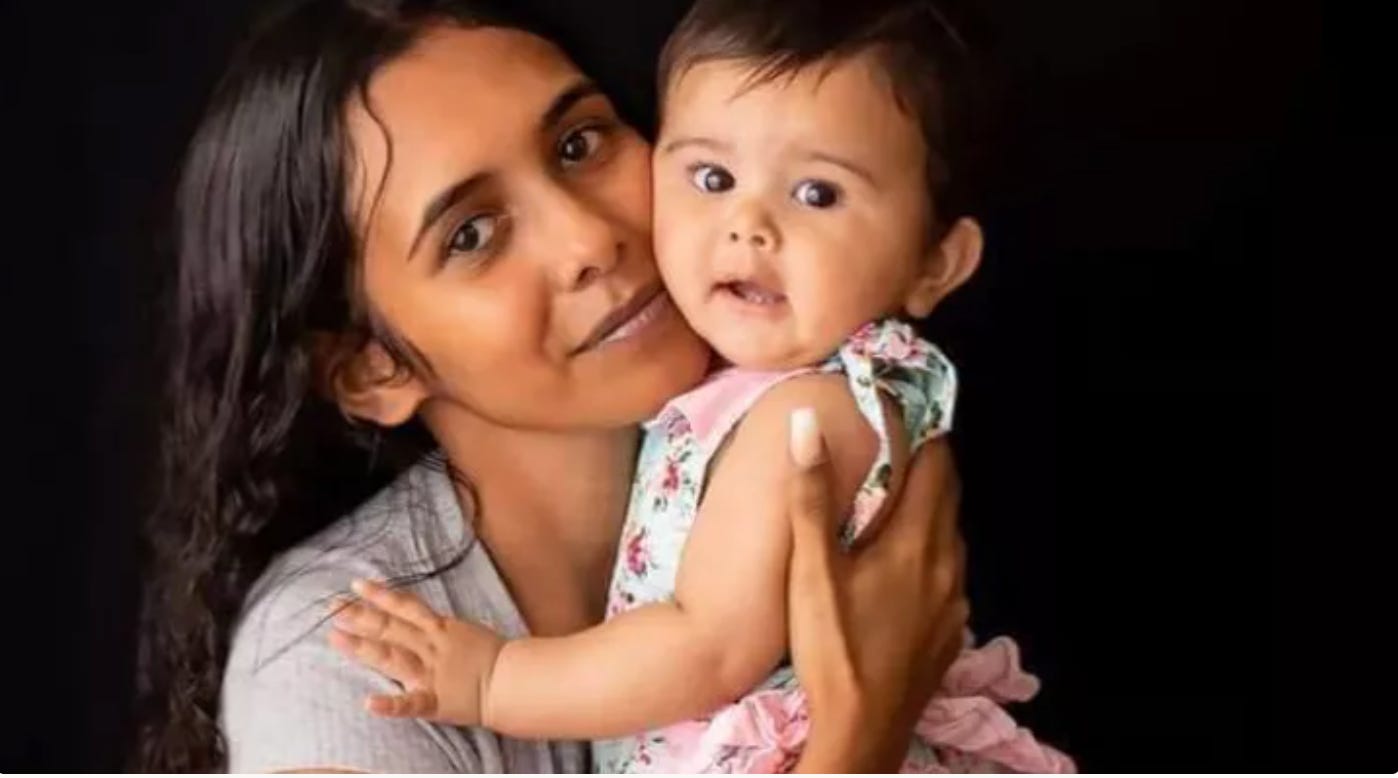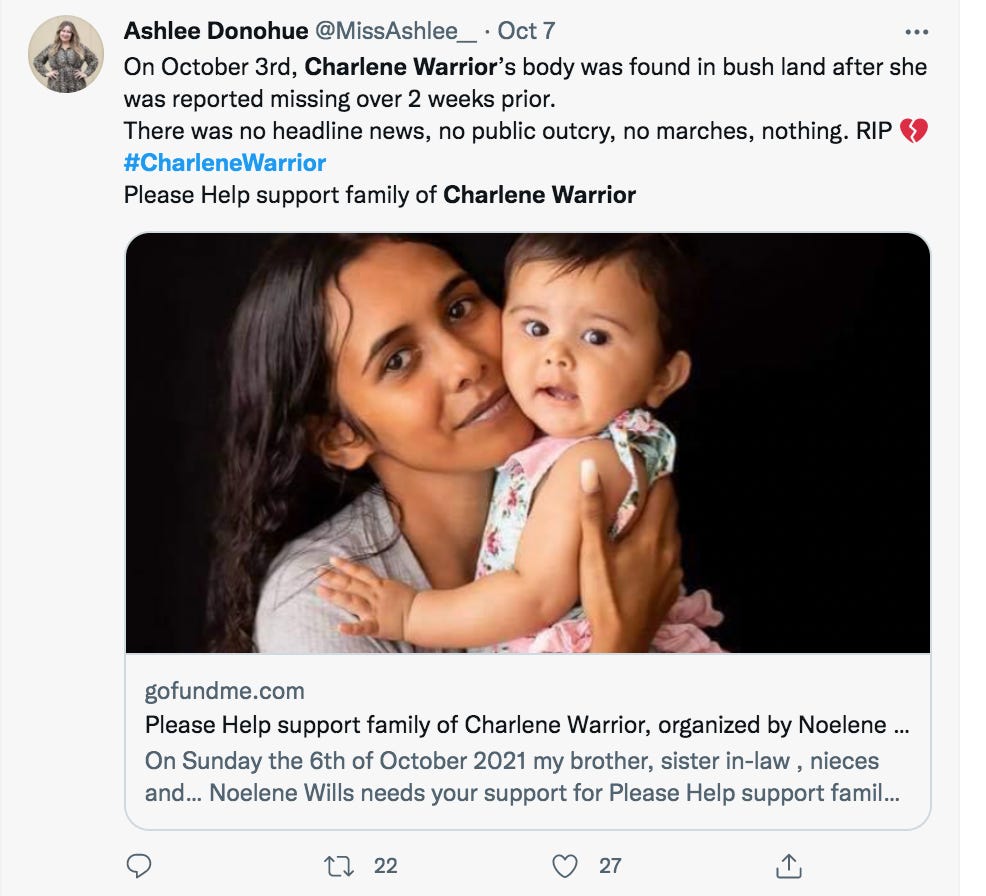Gudamulli!
Last week was a hard week for our mob. We mourned the deaths of Gordon Copeland in Moree, Charlene Warrior in Bute, and JC in Geraldton. Because these cases are still being investigated, I have been careful with my commentary in this newsletter, but I urge you to follow the cases and support the families.
One of the best ways you can support these families is by donating to them. I have not been able to find a place to donate to Gordon Copeland, but you can support Charlene’s family here.
You can also support JC’s family here as the trial continues.
LAST week I saw a brilliant conversation between four First Nations women who I admire - Karla McGrady, Chelsea Watego, Bridget Brennan and Sono Leone. It aimed to interrogate white feminism and the Australian media. The panel was held following a long, hard week, in which black Australia mourned the deaths of three young Aboriginal people who lost their lives. One of them was young mother Charlene Warrior in Bute, South Australia, and the other Gordon Copeland, in Moree, NSW. Both Charlene and Gordon had been missing for an extended period of time, and in both cases their families and communities had searched for them, while media paid them little attention. We also remembered Aboriginal woman JC in Geraldton, who was shot by a police officer last year. The cop in question, who has not been identified, has been charged with her murder, and the trial began last week in the WA Supreme Court. Despite its significance - it is believed to be the first time in over 90 years that a WA cop has been charged with murder “during the line of duty” - JC’s case has not lead national coverage.
Charlene Warrior with her one-year-old daughter.
In the midst of a suffocating national silence, Aboriginal mob from all across the country paid tribute to the lives of Charlene, Gordon and JC. This was on my mind as I watched the panel, and particularly during one part, where Bridget, who is ABC’s Indigenous affairs editor, spoke of her experiences reporting stories of violence against Aboriginal women. She had written a brilliant report centring the voices of the Tangentyere Women’s Safety Group in Alice Springs. After publishing the piece, one of her colleagues had commended her for the story, and had told her that often Aboriginal women did not want to speak out on issues of violence. Bridget had been shocked by that assessment, because she had said it wasn’t a question of Aboriginal women being voiceless, but that their voices had not been amplified.
In the conversation that followed, Chelsea had made the point that it was not just the failure to amplify black women’s voices, but that there were deliberate attempts to silence them. Aboriginal women are not silent on issues of violence, but in this place, there is an active, deliberate silencing. Last week, Aboriginal women rose up to resist this silencing, particularly in the case of Charlene. There had been very few media reports on her disappearance before she was found and it was not lost on many of us that if it had been a white woman who had disappeared, there would have been more attention, and a greater public outcry.
Just like the colleague’s logic in Bridget’s anecdote, Aboriginal women are often held responsible, or out-right blamed for what is actually a deliberate silencing of our voices, even while we do everything possible to garner attention. There have been several high profile cases of non-Indigenous women who have lost their lives, and these cases spark national displays of mourning, lead to candle-lit vigils, and lead news coverage. While this is important, the question that is always asked is - why don’t the deaths of our women garner the same response?
Aboriginal women who are victims of violence are often re-victimised in media representations following their deaths. They are painted in dehumanising terms, and seen as responsible for their own deaths. When attempts are made to ‘humanise’ them, it is always in language that sees ‘human’ as close to whiteness, as most palatable to white Australia. Their resistances to overlapping waves of violence throughout their lives, resistances that may not be recognised as such, do not always fit this criteria, and so these resistances are interpreted as ‘angry’ or ‘violent’ and they are dehumanised again. I’m thinking of this in relation to JC’s case, particularly, where her contact with the criminal justice system has obscured the violence of this very same system.
So often, ‘mournable’ deaths, the deaths that lead to displays of empathy, are mournable because women view these experiences as so close to their own. There is a common mantra that accompanies this: “It could have been me”, “It could have been us”, “it could have been any woman”. In many cases of murdered and missing Aboriginal women, it would not have been ‘us’, or ‘me’. The unique experiences of Aboriginal women resisting violence is inconceivable to a public accustomed to viewing us solely as perpetrators, and if we are not perpetrators, than complicit in a ‘silence’. ‘Humanising’ means focusing on the similar, ‘universaling’ our experiences as women, but denying the oppressions that make us vulnerable to these forms of violence - for example, the oppressions that made JC vulnerable to being visible to police on the day she died. In that sense, I feel ‘humanising’ can often be used as a silencing tactic, because it makes our worthiness dependent on our closeness to whiteness, and further obscures the violence that is unrecognised by white Australia because ultimately, it benefits them.
Silencing often works by not only silencing the voices and testimonies of black women, but by replacing the ‘silence’ with a discourse that is most palatable to White Australia. That is why ‘racism’ is only spoken of by blackfellas, who know intimately the realities of racist violence in this colony, and why there are deliberate attempts to make claims that this is not violence, but protocol or procedure.
By remembering our people who have lost their lives, by making claims of their worthiness as people, and by making visible the violence - not only that which ended their lives, but which they resisted throughout their lives - we resist these active attempts at silencing. We must continue to mourn for them.







If you would like to donate to Gordon Copeland's family - here is the link https://www.mycause.com.au/p/261658/gordons-life-matters?fbclid=IwAR1gXgyTfrDrqvsXyLjHh9881-p4TmdUw3YwAyQ3aSR01p8vNujiN3OXnco
My condolences to all families I'm so angry how many go unsolved and nothing done to help families the same happened in my home town gawler SA Rose Turner found dead at home 15/10/21 after someone assaulted her not long before was in news one night the person who assulted her who happens to live behind me has only been charged for assault but now it's just mysterious death and police doing nothing there's no updates they've done nothing to give rose's young daughter information on her mother I'm so angry about all this they deserve peace families deserve answers